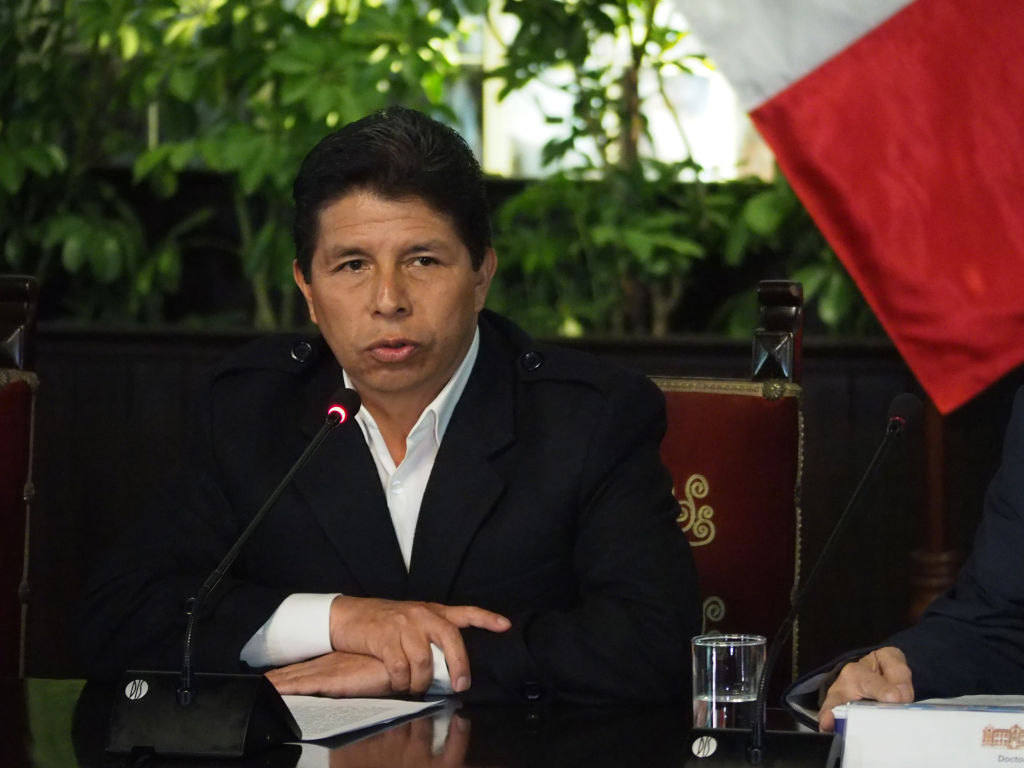
Peruvian President Pedro Castillo sparked fears of a coup Wednesday after temporarily dissolving Congress just hours ahead of an impeachment vote. But his efforts to stay in power quickly fell apart as lawmakers swiftly voted 101-6 to remove Castillo and replace him with Vice President Dina Boluarte. She is the sixth leader of the politically tumultuous country since 2018.
Peru elects presidents for one, five-year term at a time. While politicians can be reelected later in their careers, they cannot serve consecutive terms. Castillo’s presidential term began last July; he was elected without any governing experience and faced numerous corruption allegations throughout his tenure.
Here’s everything you need to know about Castillo’s attempt to stay in power.
How did Castillo attempt a coup?
On Wednesday Castillo called for new legislative elections, in addition to imposing a national curfew.
“We have taken the decision to establish a government of exception, to reestablish the rule of law and democracy to which effect the following measures are dictated: to dissolve Congress temporarily, to install a government of exceptional emergency, to call to the shortest term possible to elections for a new Congress with the ability to draft a new Constitution,” Castillo said, according to the New York Times.
But he lacked support among key cabinet members and law enforcement, prompting mass resignations. “He was an inexperienced, unpopular, inept, politically-isolated president and those are conditions under which coups are guaranteed to fail,” says Steven Levitsky, a professor of Latin American studies at Harvard University.
This marks the latest instance of a Peruvian leader who has plunged the country into a political crisis in an attempt to hold onto their power. Former President Martín Vizcarra also dissolved Congress in 2019 before calling for new elections; lawmakers removed him from power the following year.
More from TIME
Who was opposed to Castillo’s move?
Lawmakers removed Castillo from office as a result of “permanent moral incapacity.” This was their third attempt to remove him from power. The vote came about following new corruption allegations.
The head of Peru’s army and four ministers promptly resigned in response to Castillo’s announcement.
“I strongly condemn this coup d’état and call on the international community to assist in the democratic re-establishment of democracy in Peru,” Foreign Minister César Landa—who was among those who resigned en masse from the cabinet—said on Twitter. “Castillo took this decision without my knowledge or support.”
Peru’s armed forces and police also wrote in a statement that they rejected Castillo’s call to dissolve Congress.
The ombudsman’s office labeled Castillo’s actions as a coup, demanded his immediate resignation and requested that he turn himself in to judicial authorities. “Mr. Castillo must remember that he was not only elected president of the republic, but also that the people elected representatives for public service,” the ombudsman’s statement said, per the AP. “Castillo’s actions ignore the will of the people and are invalid.”
What happens now?
Boluarte will now take Castillo’s place as President. She was sworn in on Wednesday afternoon, becoming the first woman to serve as Peru’s president.
It’s unclear how long she may stay in power. While Boluarte won’t necessarily be seen as an extension of Castillo as she has remained somewhat distant from him, opponents may still view her as a leftist and communist, according to Levitsky. “It’s not hard to imagine them turning against her as well,” he says.
Castillo has since been arrested.
What controversies has Castillo faced throughout his political career?
Castillo rose up the political ranks from humble beginnings, working in a poor farming community and later as a schoolteacher and union activist. He was elected to the presidency without any governing experience. His tenure has been marred by corruption allegations. “He just carried out old fashioned, petty, stupid corruption … you give out contracts and favors to your old friends and family,” Levitsky says.
Federal prosecutors are investigating half a dozen cases against him—many of them alleging corruption. He has denied the charges. Castillo has been accused by top prosecutors of using his power to profit off government contracts and leading a criminal organization in the Ministry of Transport and Communications.
To Levitsky, Castillo’s call to dissolve Congress reinforced both his incompetence as a ruler and the resilience of Peruvian democracy. “The President tried to kill Peruvian democracy and Peruvian democracy survived … For all of its flaws, democracy persists.”
More Must-Reads from TIME
- Inside Elon Musk’s War on Washington
- Meet the 2025 Women of the Year
- The Harsh Truth About Disability Inclusion
- Why Do More Young Adults Have Cancer?
- Colman Domingo Leads With Radical Love
- How to Get Better at Doing Things Alone
- Cecily Strong on Goober the Clown
- Column: The Rise of America’s Broligarchy
Write to Sanya Mansoor at sanya.mansoor@time.com